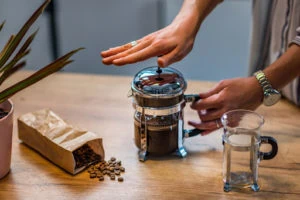Can Lemonade Go Bad?
Nothing says summer like a cold, delicious lemonade – especially freshly squeezed! The amazing tang of the lemons and sudden rush of sweetness is truly the stuff of nostalgia, but how long does it really last? Can lemonade go bad?
While you may have heard that the citric acid of lemonade protects it from going bad, this has more to do with room temperature lemonade, and that acid only keeps the lemonade fresh for up to 2 hours. Once in the fridge, however, freshly squeezed lemonade will last 5 to 7 days, and you can freeze it for up to 6 months – but it’s really going to be its best before the 3-month mark.
Of course, that’s not to say that there aren’t tricks and hacks that can extend your lemonade’s shelf life and that’s going to be our subject for today. We’ll talk about why lemonade goes bad, different methods to preserve it, and along the way we’ll share some useful hacks for getting the most out of your favorite summer beverage.
If you’re ready, then let’s talk about lemonade, its longevity, and what you can do to stretch the limits!
Can a high-citrus drink like lemonade really go bad?

While citric acid can certainly keep bacteria and even some viruses at bay for a little while, it doesn’t mean that your lemonade is going to be ‘immortal’ – it just means that only the hardier microorganisms are going to be present in your acidic drink.
As a general rule, you don’t want to leave it sitting out at room temperature for more than 2 hours. Thankfully, as a summer drink, you’ve usually got a pitcher full of ice and this certainly buys you time, but we don’t recommend pushing it too far over that 2 hour limit. The problem is microorganisms and bacteria in the air will find their way to the lemonade and while the citric acid will kill some of these little pests, the tougher organisms will start multiplying and the drink will become unsafe.
There are lots of options for extending shelf life, so let’s take a look at those so that you’ll have a few tricks up your sleeve to ensure that you can get your ‘lemonade fix’ with as little effort as possible.
Ways to make your lemonade last longer

In this section, we’ll talk about your different storage options so that you know what to expect, and we’ll also share a few tricks that you can use to enjoy your lemonade a little longer or to whip it up ‘on the quick’ when you’re looking for a solo serving or ‘fresh lemonade for two’.
We’re going to focus on freshly squeezed lemonade – just sugar, water, and fresh lemon juice – as the commercial varieties already have a use-by label to tell you how long they last. With that said, let’s look at your options.
Refrigerator
In the refrigerator, freshly squeezed lemonade is typically good for 5 to 7 days – although it will be a little more sour if you wait until the 4 or 5-day mark. That’s because there will still be some bacteria present, munching on the sugar in your drink, so it will naturally taste less sweet.
One trick you can do is to get or make an opaque pitcher, preferably with a lid, so that the lemonade is stored in the dark. This helps a little if you are bad about putting the pitcher back into the fridge as it provides a little shield from the light, as light can cause your lemonade to oxidize a little faster. It won’t make much difference inside the refrigerator, however, since it’s always dark until you open it.
There’s not much else that you can easily do in the refrigerator, and while that can be frustrating because you always have to have lemons stocked, you CAN make the lemons themselves last longer if you invest in a vacuum sealer. If you haven’t used one before, they really work a treat for sealing all kinds of things, and sealers like this Fresko vacuum sealer are very inexpensive and a real game changer for ensuring your lemons and other favorite foodstuffs can get a longevity boost in your fridge.
Vacuum-sealed, your lemons can stay fresh in the fridge for as long as 2 – 3 months!
If you don’t need that long, then you can store lemons in a jar of water in your refrigerator for 2 to 3 weeks and they’ll taste amazing when you need them, or you could simply put them in a ziplock and they will stay fresh for up to 4 weeks – just try to get as much air out of the bag as you can by sealing it with a straw in the corner and sucking out the air before sealing the final bit.
Fresh ‘Carny’ Lemonade
The reason why storage isn’t such a worry with lemonade is the fact that it is so easy to make in just 2-3 minutes. Your author had the good fortune of working at a traveling lemonade stand for carnivals and flea markets, so today we’re going to share a quick lemonade method that you may have seen before at local lemonade stands.
Here’s what you’ll need:
- A wooden spoon
- 1 lemon per lemonade
- 3 spoons of sugar (to taste, so that’s flexible)
- 2 plastic cups – one of which has a larger lip than the other
- Water
- Ice
Steps to make your lemonade:
- Clean your lemon first. Cut off the side tips and then cut straight down the center of your lemon, pop these two halves into the smaller cup, and smoosh them with your wooden spoon.
- Add in your sugar fill It halfway up with water and add a small handful of ice.
- Take the larger cup and put it over the top of the smaller one, so that you have a basic air seal, and then shake your mixture up and down – You may have seen folks do this at the fair to make a ‘show’ of whipping-up your fresh lemonade and it mixes it up perfectly.
- The agitation should melt the ice a little as it mixes your lemonade perfectly and with a little practice, you’ll know exactly the amount of water to make a single serving of perfect fresh lemonade.
Try this once for giggles and once you get a taste, you might not even care about refrigerating your lemonade ever again – it’s so EASY and since it’s fresh, you’ll get spoiled and you won’t want it any other way!
Freezer
You can freeze lemonade for up to 6 months in your freezer, although it will taste its best if you drink it before the 3-month mark. You know how to make a single-serve ‘carny’ lemonade now, though, so a little freezer strategy can really go a long way if you intend to freeze your lemonade.
Why not just freeze the lemon juice itself?
You can use your ice cube tray and freeze pure lemon juice so that you crunch up a cube or two, add a little sugar and water, and shake it up for a yummy and quick lemonade on demand.
You can certainly freeze the lemon juice with sugar as well, although some folks prefer to go with just the juice so that if you are entertaining guests they can decide their own level of sweetened – it’s your call.
There is one more preservation trick that you can do with a freezer, though, and that’s to make your own lemonade concentrate. It’s surprisingly easy to do, so we’ll detail the steps for you in the next section!
Making your own lemonade concentrate
Making your own frozen lemonade concentrate is a piece of cake, thanks to this recipe from Heath Goldman from Real Simple. In just 15 minutes, you can make 5 cups of syrup concentrate (about 16 servings) for lemonade and once you get a taste of it, you’ll definitely want to stock a little in the freezer for an instant sweet and sour treat. Best of all, this concentrate will last for 3 weeks in your refrigerator and up to 6 months in the freezer, so let’s take a look at how it’s done!
Here’s what you’re going to need:
- 2 cups of sugar
- 2 ½ cups of freshly squeezed lemon juice (approximately 15 medium-sized lemons)
Steps to make:
- In a medium-sized pot, bring 1 ¼ cups of water to a boil and add your sugar into it, stirring occasionally, while it’s heating up. We want it to be fully dissolved, which should take about 2 minutes. Once the sugar is fully dissolved, remove your pot from the heat.
- Mix your fresh lemon juice with your sugar syrup and store in an airtight plastic container. It’ll keep for 3 weeks in the fridge, or 6 months in your freezer.
- To use your concentrate, fill a cup with ice, mix 1 part water to 1 part syrup in a separate cup, and pour that cup over your ice and you’ve got an instant yummy lemonade!
How can you tell when lemonade has gone bad?

Since lemonade is a sour drink already, how can you tell when it’s going bad? Below we’ll list a few things that you can check for so that you’ll know if it’s time to chuck out that lemonade and mix up a fresh batch:
- Taste – If your lemonade seems a lot sourer than usual, then it’s best to throw it away – don’t just add sugar! When lemonade starts going bad, you’ll have bacteria and other microorganisms too small to see that are eating up the sugar in your drink, so if it tastes super-sour, it’s probably not safe.
- Appearance – If your lemonade has darkened in color, get a bit cloudy, and ESPECIALLY if you see anything powdery-looking or chunky in there, then don’t even risk a taste of it. Pour it into the sink and make a fresh batch!
- Smell – Fresh lemonade smells delightful – almost like sweet lemon rinds in your nose! If your lemonade has started to produce a sour smell, however, you’ll notice it and it’s best not to drink it. Sometimes it’s just the bacteria eating up the sugars inside, but lemonade can also start fermenting in the right kinds of conditions. So, if it smells off, don’t risk it – it’s not worth the stomachache or worse that you might get later.
FAQs
It’s just about time for us to conclude our lemon lark for the day, but before we make our exit, we’ve got a few frequently asked questions on lemonade, lemons, and knowing when they go bad. Let’s take a look!
How bad is spoiled lemonade for you?
Spoiled lemonade can give you food poisoning if you are not careful or very unlucky. The citrus juice makes for a nice little environment where e-coli, salmonella, and other bacteria can multiply enough to make you very ill.
As such, if you aren’t sure that your lemonade is still good, it’s really best not to drink it – you can make more in just a few minute’s time and not only will it taste better, but you won’t be risking a trip to the hospital!
What does bad lemon juice smell like?
More often than not, bad lemon juice simply smells like mold. While that’s kind of gross, it’s also very useful to know, because if your lemon juice has gone bad, it’s almost always going to smell bad, too.
What does spoiled lemon taste like?
Lemons that have been in the fridge too long tend to shrink and while they might be mold-free, they could still be bad. The difference will be apparent in the amount of juice that it produces and in the taste of that juice. Shrunken, bad lemons won’t produce anywhere near the same amount of juice and what you get will taste very astringent.
So don’t worry – if your lemons have gone bad, you’ll know!
Just in case you’re interested, the video below will tell you a 19th-century recipe for making your own powdered lemonade – and it tastes a lot like the stuff that you buy in the store. It’s a pretty cool recipe, so if you don’t have time to peek now, just be sure to open it and make a bookmark – this one’s a keeper!
In Conclusion
Today we’ve answered the question ‘can lemonade go bad?’ and the answer is a resounding ‘yes!’. While citric acid can harm some bacteria and microorganisms, there are still tougher ones that will end up in your lemonade and in just 2 hours at room temperature, it could start to become unsafe.
Stored in the refrigerator, you can keep it for 5 to 7 days, and you can also freeze it for 3 to 6 months – although it will taste better if you drink it before the first 3.
Finally, don’t forget that you’ve got an edge with lemonade, in that it’s one of the easiest drinks to make ever! With some vacuum sealed lemons stocked up in the fridge or even some lemons in water jars, you’ll just need sugar and water and a minute or two of time to enjoy your lemonade fresh.
Thanks so much for your visit and we hope to see you again soon!





David learned to cook at an early age after his mother told him that he couldn't live on pizza forever, Dave uses his modest kitchen skills to recreate sorely-missed recipes from home and to occasionally make new favorite ones from places he is visiting.